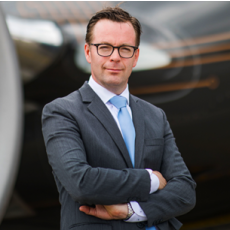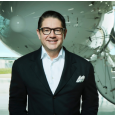Embraer is a global aerospace company headquartered in São Paulo, Brazil. It was founded in 1969 and is now the third-largest producer of civil aircraft in the world, known for its design, development, and manufacturing of smaller 150-seat bodies.
Looking back, how did your background and upbringing in the northern Netherlands lead you to your passion for the aviation industry?
I grew up in my parent’s bakery, so that experience taught me a lot about running a company on a small scale and working across various roles, which is similar to managing a larger company. Early on, I wanted to be a pilot and even went through pilot selection, but ended up in aeronautical engineering.
I later found a passion for the technical and airline operations side of things and never pursued becoming a pilot. After 15 years with KLM in different roles, I joined Embraer, which, as an aeronautical engineer, was a dream come true. Embraer is the number three OEM in the world, with over 6 billion in revenues annually. Despite its size, it runs like a family company.
Given the current Airbus-Boeing duopoly in the market, how do you see Embraer positioning itself competitively in the future?
There's a lot of discomfort and uncertainty with the Airbus-Boeing duopoly, and airlines are considering how the market will develop. Celebrating our 55th anniversary, we've grown in the segment of up to 150 seats - our core market - and have now developed great commercial aviation products, executive jets, and defense jets, such as the KC-390 and the E2, which are the best narrowbody aircraft available today.
Our focus now is to bring these aircraft to market. We faced challenges over the past years with the E2's introduction, Boeing discussions, and COVID. But now in 2024, we're in a harvesting season with a strong product lineup. We're recognized for our engineering strength, but moving into larger aircraft markets requires careful consideration of all options.
The industry has observed a rise in demand for executive travel post-pandemic. In your opinion, what are the factors driving its growth in 2024?
The drive for owning aircraft has surged post-COVID - pre-COVID, we sold aircraft for the current and next year; now, we're sold out for the next few years. The capital is there, and Embraer has developed bespoke executive jets that people love.
Our Phenom 300 has been the best-selling aircraft in the United States for 12 years, and our brand is well-regarded in the executive market. We're seeing a lot of market traction, especially in connecting smaller cities, with promising discussions in Asia. It's a combination of product quality, strong branding, and market demand driving this growth.
You are actively studying new technologies under the Energia project family of aircraft. What are the main challenges associated with introducing electric and hydrogen-powered models to the market?
We're looking at fully electric, hybrid, and hydrogen options, depending on the aircraft size and application, and our Energia family models are being discussed with customers to gauge feasibility. The biggest challenge is developing a hydrogen supply chain for airports. The market size is another question—while people say they want to fly green, the real test is whether they'll pay for it. The commercial feasibility for smaller aircraft segments has declined, raising doubts about market demand for new, green aircraft.
EVE, our subsidiary, is developing a five-person electric helicopter-style aircraft for vertical takeoff. We see electric applications for very small aircraft with ranges of 100-300 kilometers. For larger aircraft, we look at hybrids and sustainable aviation fuel use combined with electric. In the longer term, we consider hydrogen fuel cells and possibly burning hydrogen. This roadmap extends to 2050, but immediate steps include reducing fuel burn and promoting sustainable aviation fuel. EVE's electric aircraft is our first step toward these new technologies.
You recently announced collaborations with Avfuel as well as Brazilian energy company Raizen. Can you tell us more about the reasons behind these partnerships?
Brazil is well-positioned to become a major producer of sustainable aviation fuels (SAF). Brazil is the most developed country in terms of ethanol use for cars, a very green energy source. Embraer is supporting sustainable aviation fuel production in partnership with Avfuel and Raizen. We aim to reduce aircraft fuel burn, with our E2s achieving up to a 30% reduction, and promote sustainable aviation fuel to achieve net zero by 2050. Sustainable fuel is crucial for the remaining fuel we burn to be as green as possible.
How does Embraer plan to tackle the looming workforce challenges in the aviation industry?
The U.S. faced a pilot shortage due to early retirements and the challenge extends to engineers and the supply chain, but the situation is improving. We have a partnership with CAE to provide simulators for pilot training on our E2s. For engineers, we actively engage with schools and universities in Brazil to attract talent into aviation. Attracting experienced professionals back into aviation is crucial for industry improvement and the development of cleaner technologies for the future.





